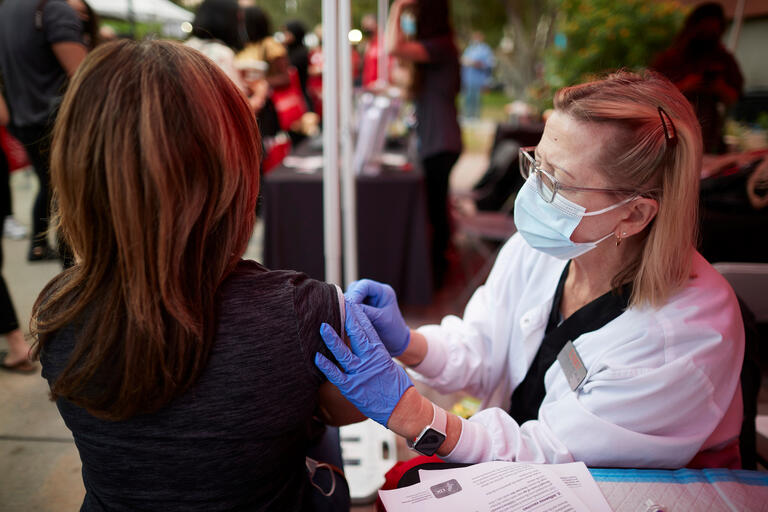UNLV’s Vaccine Confidence Team Supports Nevada Parents in Protecting Children through Education
Enhancing Vaccine Confidence Among Nevada Parents: The Role of UNLV’s Public Health Initiatives
Vaccine hesitancy remains a significant challenge in public health, especially among parents responsible for making vaccination decisions for their children. Recognizing this, the University of Nevada, Las Vegas (UNLV), through its School of Public Health, has launched targeted efforts to educate and reassure Nevada parents about childhood vaccines. This comprehensive approach leverages research, community engagement, and digital outreach to promote vaccine confidence across Nevada.
UNLV’s Commitment to Public Health and Vaccine Education
UNLV’s School of Public Health has long been dedicated to advancing community health through education, research, and outreach programs. One of its recent and impactful initiatives is the Vaccine Confidence and Demand Improvement project. This project, a collaboration with the Nevada Division of Public and Behavioral Health and funded by the Centers for Disease Control and Prevention (CDC), aims to combat vaccine hesitancy among parents of Nevada children by providing accurate information and addressing misconceptions.
The university’s efforts are particularly timely given recent data indicating that the exemption rate for childhood vaccines in Nevada is higher than the national average, with 6.7% of parents claiming exemptions versus the national average of approximately 3%. This statistic underscores the importance of community education to ensure high vaccination rates necessary for herd immunity and community health safety.
Understanding Vaccine Hesitancy and Its Impact on Public Health
Vaccine hesitancy is complex and influenced by various factors, including misinformation, mistrust in healthcare providers, socioeconomic barriers, and cultural beliefs. In Nevada, certain factors such as transportation difficulties, lack of healthcare access, and social media misinformation contribute to parents delaying or refusing childhood vaccinations.
UNLV researchers and faculty emphasize that vaccine confidence isn’t just about individual choice but also about community health. When vaccination rates drop below the herd immunity threshold—typically around 95% for highly contagious diseases like measles—the risk of outbreaks increases significantly. Nevada’s current exemption levels threaten this delicate balance, making educational outreach vital.
Strategies to Promote Vaccine Acceptance in Nevada
Research-Driven Community Engagement
UNLV’s team of public health experts conducted extensive demographic research to understand why some Nevada parents hesitate to vaccinate their children. The insights gained have informed their outreach strategies, including creating tailored messaging that resonates with diverse communities. By understanding specific concerns—such as fears about vaccine safety or mistrust in medical institutions—the team can develop more effective communication.
Utilizing Digital Platforms for Outreach
Recognizing that modern parents are heavily engaged on social media, UNLV’s Vaccine Confidence team has created dedicated social media pages and an interactive website to disseminate factual information. This digital approach allows the university to reach a broad audience efficiently and counteract misinformation that often spreads rapidly online. Social media campaigns are designed to be relatable, evidence-based, and culturally sensitive, fostering trust and encouraging vaccine series completion.
Addressing Socioeconomic and Logistical Barriers
In addition to misinformation, logistical issues like transportation and time constraints are significant barriers. UNLV’s outreach includes providing resources and guidance to help parents navigate these challenges, such as information on local clinics, vaccination scheduling, and transportation options. The goal is to make vaccines accessible and convenient to ensure higher completion rates of childhood immunization schedules.
Community-Centered Education and Trust Building
The Vaccine Confidence team emphasizes relationships with community leaders, pediatricians, and local organizations. Trusted figures play a crucial role in influencing parental decisions and dispelling fears. UNLV’s efforts involve collaborating with these stakeholders to create a unified, credible voice promoting vaccination benefits and safety.
Furthermore, the team recognizes the importance of empathy, understanding parental concerns without judgment. Educational sessions, Q&A forums, and culturally sensitive materials help foster open dialogue, allowing parents to voice their fears and receive accurate, reassuring information.
The Role of Universities and Public Health Institutions in Preventing Outbreaks
Universities like UNLV are vital in safeguarding public health through research and community engagement. Their work extends beyond education to active participation in outbreak prevention. For example, recent measles outbreaks in other parts of the USA highlight the consequences of insufficient vaccination coverage. Nevada’s public health infrastructure benefits from collaborations with academic institutions, which bring expertise, resources, and innovative communication strategies.
By promoting vaccine education and confidence, UNLV aims to prevent outbreaks, protect vulnerable populations, and maintain herd immunity—crucial steps for community resilience and public health security.
How Parents in Nevada Can Take Action
- Stay Informed: Access reliable information through resources provided by UNLV’s Vaccine Confidence team, CDC, and local health departments.
- Communicate with Healthcare Providers: Engage in open discussions with pediatricians or healthcare professionals to address concerns and understand vaccine safety and efficacy.
- Utilize Digital Resources: Follow verified social media pages and websites for updated, accurate vaccine information tailored to Nevada communities.
- Address Barriers: Seek assistance for transportation, scheduling, or language barriers that may hinder completing vaccination schedules.
- Participate in Community Events: Attend local health fairs or educational sessions organized by UNLV or other community organizations.
Conclusion: Supporting a Healthy Nevada through Vaccination
The university’s initiative exemplifies how academic institutions can actively contribute to public health efforts by educating communities, combating misinformation, and addressing accessible healthcare barriers. For Nevada parents, making informed decisions about childhood vaccines is essential not only for their children’s health but also for the broader community’s safety.
If you’re interested in learning more about how UNLV’s School of Public Health is making a difference or want to get involved, visit their website or follow their social media channels. Together, through information and cooperative efforts, Nevada can build a healthier, vaccine-confident future.


